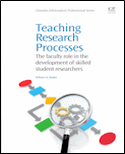


Teaching Research Processes: A Workshop (Indiana-Purdue University, October 3, 2014)
William Badke - Trinity Western University, Langley, B.C., Canada (badke@twu.ca)
![]()
Part One: Introduction to the Problem (9:30 - 10:30 a.m.)
1. Prezi – Student Alienation in the Information Age (http://prezi.com/-xapja3o4oie/student-alienation-in-the-information-age/)
2. Thinking Back
Try to remember the first time you entered an undergraduate class in a subject area completely new to you. What questions were you asking yourself? Suggestions:
a. How hard does he/she grade?
b. How many assignments and what kind?
c. What is this subject about? It seems pretty strange to me.
d. Overall, what is this prof going to do to me, and how do I survive it with a good grade?
3. Student ability in the Information Age (http://prezi.com/zxuirf162axa/student-research-ability-the-challenges/)

Bibliography of gaps in student research ability (PDF)
4. Assignments
Analyze the following typical research assignment:
Write a paper of 2000 words on one of the following topics (or pick a topic of your own that is relevant to the course). Show good critical thinking. Your bibliography must contain a minimum of 5 books and 3 peer reviewed journal articles. Do not use Wikipedia or the Internet. Proper APA format must be used.
- What does it mean to write a paper on a topic? Do I describe the main features of the topic? Narrow down to a specific feature or two? Reflect on what I think about the topic?
- How exactly does critical thinking relate to writing a paper? Am I supposed to criticize the topic? Am I supposed to think more deeply about the topic?
- I understand the books requirement, but what are peer reviewed journal articles and how do I know when I have one?
- Am I not allowed to even look at Wikipedia? Are e-books out? If electronic articles are on the Internet, do I have to use paper form journal articles?
- Where can I get information about APA format?
Part Two: The Challenges of Incorporating Research Processes Instruction into the Curriculum (10:45-11:15 a.m.)
A focus on the arguments from William Badke, "Why Information Literacy is Invisible." Communications in Information Literacy 4, no.2 (2010): 129-141.
http://www.comminfolit.org/index.php?journal=cil&page=article&op=viewFile&path%5B%5D=Vol4-2010PER3&path%5B%5D=119.
Challenges to Incorporating Information Literacy Into the Curriculum (https://docs.google.com/presentation/d/1wZcsMlTUU46bPBQjqVyfYhwFnfeNF60hn3HQuITXFQQ/pub?start=false&loop=false&delayms=3000)
Part Three: A vision for research processes instruction within the foundation of every course - Disciplinary Emphasis (11:15-12:00)
What do we mean by "discipline?" (https://docs.google.com/presentation/d/1HZMwvyViWZokE-HM9gG5M6cY4MPp7cDluO_9tcH9Y-E/pub?start=false&loop=false&delayms=3000 )
Essence of the Disciplines (PDF Infographic)
Part Four: Classroom activities and assignments for research processes (1:00-2:15 p.m.)
Related PowerPoint: https://docs.google.com/presentation/d/1z7L4_JCehMAflb_flJnXKdPkepfAQShMF2RW_mcwXmQ/pub?start=false&loop=false&delayms=3000
Part Five: Implementation (2:15-3:00 p.m.)
Implementation must begin with discussion. Here's an example of a recent presentation I did with faculty as we evaluated a new set of institutional learning outcomes: http://prezi.com/e-vjg_4afxge/a-path-to-achieving-cognitive-complexity-critical-thinking-research-information-literacy/

Key Issues:
1. Grassroots or administrative implementation?
2. How to get buy-in from faculty and administration
3. How to turn ideas into institutional practice
4. If librarians are significant to implementation, how can the institution involve them despite their limited numbers?
5. Dealing with objections:
a. I have to teach content.
b. I have no experience with teaching research processes.
c. I don't want librarians dictating how I teach.
d. There is no guarantee that all this effort will make better researchers.
e. I simply don't have the time to make all these changes in mid-career.